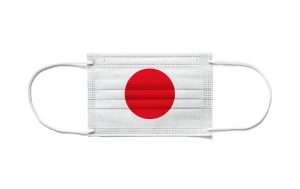Japan is preparing to shed mandatory COVID-19 measures placed on medical facilities in an effort to ease the administrative burden as an eighth wave of infections overwhelms frontline services. From May 8, COVID-19 will be reclassified to a less serious category, which means hospitals and testing facilities are no longer legally required to report all positive infections to public health centers, determine which patients require hospitalization, and advise home quarantine.
The government has been facing growing pressure from ruling Liberal Democratic Party (LDP) lawmakers and medical and business lobby groups questioning the effectiveness of mask wearing and the mandatory COVID-19 medical reporting system. They argue that Japan should bring its COVID-19 response up to the global standard, where outdoor and indoor mask wearing are no longer mandated. The move also means lifting nearly all remaining restrictions.
The government’s COVID-19 expert panel proposed treating the virus as a common cold and recommended a gradual phasing out of current COVID-19 infection response measures. Instead, the Ministry of Health is shifting its pandemic approach to “individual choice.” They recommend people weigh up the risks and use their own judgment when it comes to masks, getting tested, and determining whether or not to quarantine.
But this increases uncertainty over how society should respond to the pandemic, particularly at a time when Japan recorded 520 deaths on January 11 – the highest daily death toll since the start of the pandemic three years ago.
Experts are divided on lowering the COVID-19 classification, with some worried the move may be premature and lacking a scientific basis. A Ministry of Health survey found that only 27 percent of the Japanese population had COVID-19 antibodies, compared to more than half of the U.S. population. It’s estimated that 94 percent of the population must be immune to stop the spread of the virus.
In the early days of the pandemic Japan managed to escape a deadly COVID-19 outbreak. Its relatively low mortality rate was frequently labeled as a “mystery.” But three years on, its lucky streak appears to be over. A record 7,688 people died from COVID-19 in December, the majority aged 60 and older. The daily number of new deaths remains high even still.
A lower legal classification for COVID-19 also raises questions about continued financial assistance to fever clinics and outpatient coronavirus treatment facilities. Medical expenses such as vaccines are free of charge as a special measure and antiviral medication are heavily subsidized, as COVID-19 is currently considered a Category 2 (second highest) deadly disease, on par with SARS and tuberculosis. But maintaining special financial subsidies despite the virus being downgraded to a Category 5 disease is controversial since other infectious diseases, cancers, and rare diseases carry higher out of pocket patient costs.
The current vaccination rate for Japan’s Omicron variant vaccine is a low 35 percent, and the phasing out of COVID-19 subsidies may see a fall in immunizations if a fee is introduced.
While the transition may free frontline workers from tedious paperwork, the government will no longer have a legal basis to coordinate hospital capacity for COVID-19 inpatients. During a deadly outbreak in 2021 Japan’s regionalized public health system came under fire for turning away COVID-19 patients, which led the government to introduce a temporary centralized coordination system and penalties for hospitals turning patients away.
There is also criticism that cutting public spending is a major motivation behind the move. With the government pledging to double defense spending to 2 percent of GDP, downgrading COVID-19 to a lower threat enables the government to redirect budget funds reserved for the pandemic response to defense spending.
Japan is preparing to host the G-7 summit in May and it is eager to show a successful shift to “living with COVID.” While the government abolished mandatory outdoor mask wearing last year, the message is yet to filter through and masks continue to be embraced both inside and outside. The latest spike in COVID-19 deaths is only heightening people’s perceptions of risk, and it may take longer before a new normal takes hold.
































